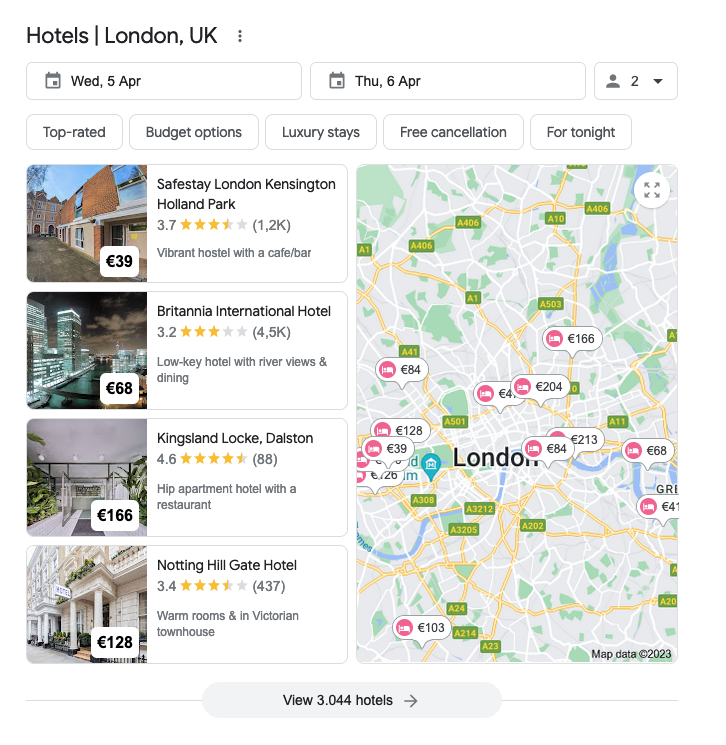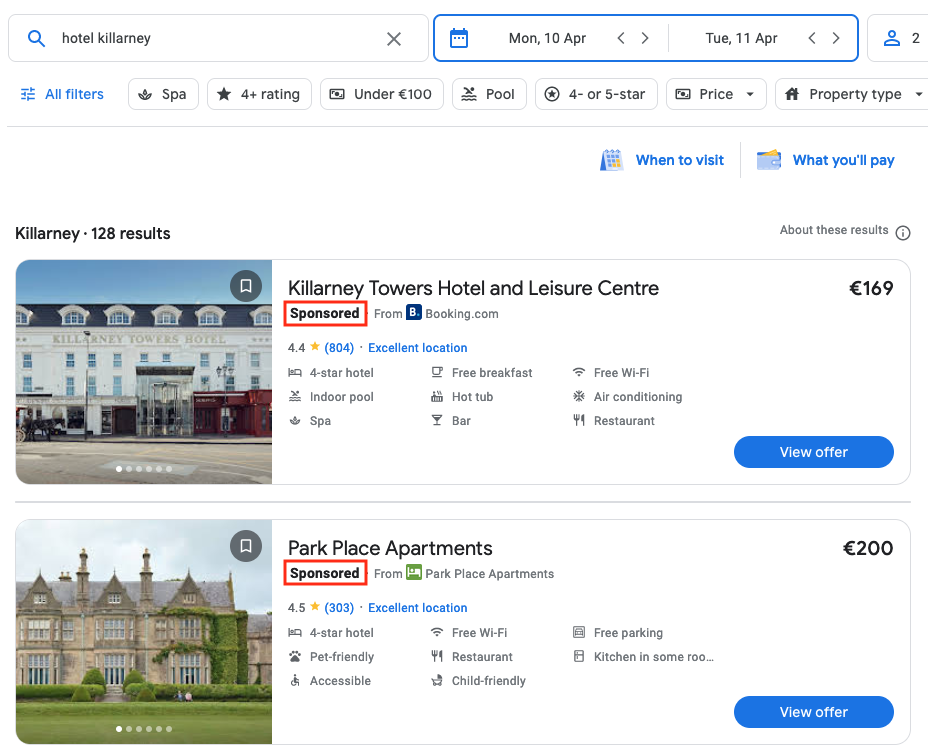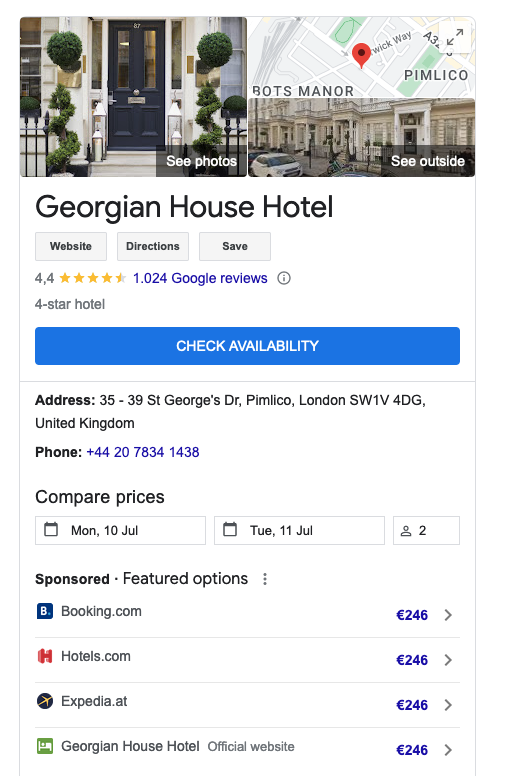
Google Hotel Ads: How to Run Hotel Ads
Being visible online is one of the biggest success factors for hotels in revenue management to attract new guests. And that’s where Google products play a crucial role: every day, travelers use Google to search for hotels. Your hotel should be at the top of the search results to be found and booked. In this article, you’ll learn how Google Hotel Ads can help you become more visible in search results and what’s behind this Google product in the first place.
Find out in this blog:
- What are Google Hotel Ads?
- How do Google Hotel Ads work?
- Google Hotel Ads and Google Ads for hotels – what’s the difference?
- In Short: How do I run Google Hotel Ads?
What are Google Hotel Ads?
When you search for “Hotel London” on Google, you will first get about three to five sponsored ads. Usually the major online travel agents (OTAs): Booking.com, trivago, TripAdvisor and Co. are right up front. For a long time, that was perfectly fine with Google, after all, it meant the hotel search engines were spending a considerable amount of money on Google for their ads.
However, because booking.com and similar OTAs became so well known that a development started that Google was not quite so keen on: The more popular and common these OTAs became, the less travelers needed Google to look up information about their accommodation. The pages of the OTAs were simply entered directly into the browser and the hotel room was booked via one of the platforms without Google generating any revenue for the website visitor. In terms of hotel bookings, this posed an ever-increasing threat to the search engine giant.
Google’s answer to this: Google Hotel Ads.
With its Hotel Ads, Google introduced a standalone campaign type as part of Google Ads, but based less on keywords. At the same time, a part of the meta search engine Google Travel was added to the search results, in which the information relevant to the searcher is used. The information is displayed in the normal search results and users can filter by:
- Booking period and number of people to choose from
- Categories like “Top rated”, “Cheap options”, “Luxury stays” or similar
- Price per night
- Google My Business star ratings of the hotel
- Special amenities
- Location on Google Maps

By clicking on a hotel or “show hotels”, the user is taken to the Google Travel search interface with further details on the hotels and a price comparison from multiple room providers. If booking.com is a meta search engine, Google Travel is probably something like a meta-meta search engine!?
How do Google Hotel Ads work?
Just like other ad campaigns, Google uses various bidding methods to demand commissions if your hotel ad is successful. Google Hotel Ads campaigns can therefore be placed using one of these bidding methods:
1. Payment based on ad click:
With the so-called cost-per-click (CPC) models, you pay when a prospective customer clicks on your ad, regardless of whether a booking is actually made. Here, Google offers automatically optimized or manual bids, or the option of a percentage-based CPC, where the bid is set as a percentage of the room rate.
2. Commission based on booking:
In the pay-per-conversion (PPC) commission model, you pay a set percentage of the converted room rate when a room is booked through your ad.
3. Commission based on guest stay:
To help hoteliers, Google has introduced a pay-per-stay model since the start of the Corona pandemic, whereby you only pay if the guest has actually made a stay at your hotel. This eliminates the cancellation risk for the hotelier. The amount of the commission is also based on the realized booking record and is only due after the guest stay has been completed.
All three models have different advantages and disadvantages. The basic principle is that you pay more for more security. Conversely, this means that Google will make your hotel ads more visible if you rely on cost-per-click bidding. In addition, it can be assumed that the cost-per-stay model will be discontinued again in the future, when times are no longer so uncertain for hoteliers.
Google Hotel Ads and Google Ads for hotels – what’s the difference?
After reading about Google Hotel Ads, is it still not clear how they differ from classic advertisements? Read on, we will explain it in more detail:
Google Ads
Most hoteliers know Google Ads (formerly: Google AdWords): You enter a search term, e.g. “Hotel Edinburgh” on Google and the first results you get are headed with “Paid advertisement“. These are the classic Google ads – consisting of a title and a short teaser text (the so-called meta description).

Especially individual hotels have hardly any chance or the necessary budget to rely on “normal” Google Ads for such generic search terms like “Hotel Edinburgh” and achieving satisfactory ROIs. Hotels should at least bid on their own names, to at least gain an edge over OTA ads and encourage direct bookings. Many other terms bid on by OTAs are too expensive since they are too general and therefor have a high search volume.
Google Ads are displayed on the first few places of search results pages but can also be served to websites of Google’s search network partners or on the Google Display Network (e.g., Gmail, YouTube, or in apps). This includes millions of other websites that embed Google Ads. In this extended network of Google, they are mostly displayed as banners, which can also include image or video material.
Google Hotel Ads

With its Hotel Ads, Google has created a way to regain more visibility for hotel ads and keep up with OTAs. These ads, as described above, are also displayed in the search results in the form of a compressed meta search engine. At first glance, these ads are not even recognizable as such, the label only becomes visible on Google Travel when you click on one of the hotels.
For the searcher, these ads have the advantage over the classic Google Ads that room rates and amenities are displayed directly. In the Google Travel results, the user also gets visual impressions of the hotels. He sees hotel ratings and receives a comparison of rates on different booking platforms.
Google itself does not offer a booking option, but only refers to the websites of the OTAs or the hotel. For hoteliers, this is THE opportunity to generate direct bookings via Google Hotel Ads.
In Short: How do I run Google Hotel Ads?
To run Google Hotel Ads for your hotel, you need three things:
- A Google My Business account for your hotel
- A Google Ads account
- Work with a Google Partner
What this means for you in detail:
Google My Business Account
Your hotel’s Google My Business account contains important information that is played out in the hotel ad. This includes:
- Location of the hotel
- Star ratings
- Pictures
- Hotel and room amenities features: are there parking facilities? Free Wi-Fi? What paid services do you offer?

Therefore, it is important to keep the information in your My Business profile up to date and attractive. Not only for Google Hotel Ads, but also for organic searches for your hotel name or in Google Maps.
What you can do specifically:
- Select the appropriate category for your hotel
- Regularly add your own high-quality images: exterior shots of the hotel, attractive food and drink photos, pictures of rooms and public areas
- Ask for reviews: After their stay, ask your guests to leave a review on Google My Business. If a review was submitted, thank them for it via a comment below.
Google Ads Account
If you want to advertise on Google, no matter in what form, you need a Google Ads account. Here you store your user data and payment methods.
In your Ads account you can place classic keyword-based advertising campaigns yourself, but for Google Hotel Ads you need a Google partner, a so-called distribution provider. If a partner supports you with your ads, you can give him access to your Google Ads account as an additional user.
Google-Partner
To run Hotel Ads, Google needs more information than for classic ads. Therefore, you need a distribution partner who provides the following information to Google in order to display a dynamic price ad in their own meta search engine:
- Current room rates for different travel periods and room categories
- Availability of your rooms
- Information about cancellation options or price advantages
- Hotel list: which hotels you want to advertise
- Point-of-sale landing pages: where users should go after clicking on the ad
Google receives the current rates from your booking system, channel manager, or PMS and monitors this information closely. This connection of your system to Google is handled by a technical partner who must be authorized by Google.
Since the beginning of 2022, HotelPartner is an authorized Google partner. This means that we offer our partner hotels the possibility to connect our revenue management systems to Google and to be able to place hotel ads.
Contact us, if you are looking to optimise your hotels revenue management and distribution through, amongst many other things, Google Hotel Ads.









